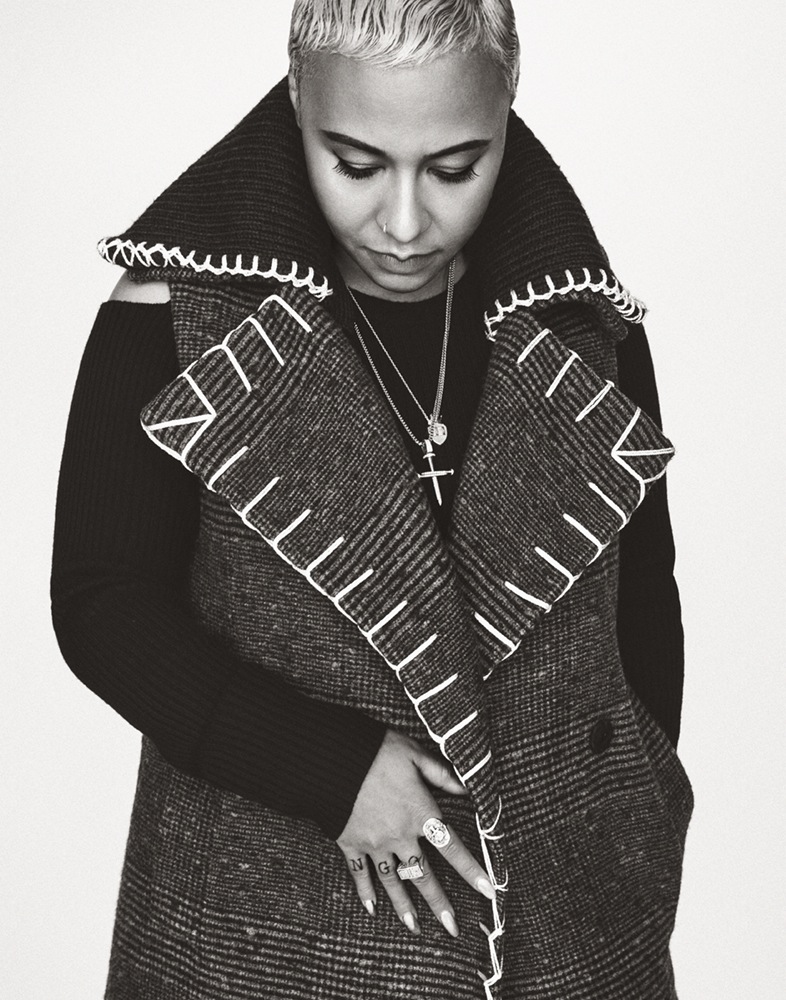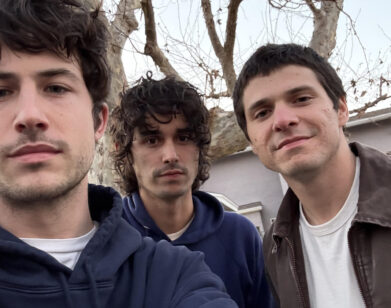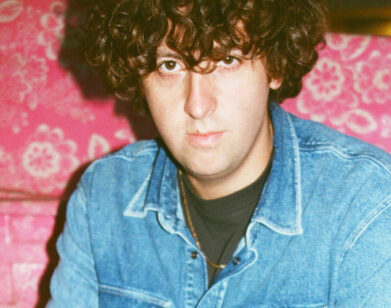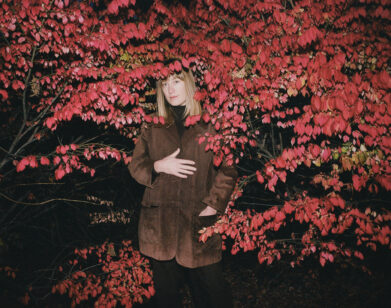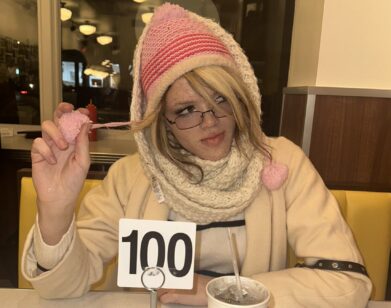Emeli Sandé
EMELI SANDÉ IN NEW YORK, NOVEMBER 2016. PHOTOS: KINYA. STYLING: CAROLINA ORRICO. HAIR: MATTHEW TUOZZOLI FOR ATELIER MANAGEMENT/BUMBLE AND BUMBLE. MAKEUP: AKIKO OWADA. STYLING ASSISTANT: JULIO NUNO.
Emeli Sandé is a chart-topping, melody-making machine, comprised of the talent, wit, and passion necessary to create an R&B hit and still feel hungry to make more. Her debut record, Our Version of Events, was nothing short of a breakthrough; in the UK, it spent 10 weeks at number one, became the best-selling album of 2012, and even gave Sandé the opportunity to perform at the opening and closing ceremonies of the 2012 London Olympics. As the Scottish musician entered the production of her second record, Long Live the Angels (Virgin)—which was released early last month—she ignored the notion of a sophomore slump, and focused on her heart instead.
“When it comes to any kind of art, you just have to do your best, and be as honest and truthful as you can be, and make songs that you love,” says Sandé. “I was trying to make songs that really meant a lot to me, so that’s how I approached it, really. I tried not to think about anything other than the music. I tried to not think about the music industry and just focused on the craft of it all.”
Apart from writing, performing, and occasionally producing her own music, Sandé also writes songs for other artists, such as Leona Lewis, Cher Lloyd, and Tinie Tempah, and is preparing for an arena tour in 2017. She scouts raw talent, including poet Áine Zion (who appears on her recent single “Garden”), and plans to continue discovering emerging artists through Hard Copy, the music publishing company she started just last week. In the struggle to match artful music with its deserving success, it seems that Sandé has most of what she needs within herself to maintain both.
NATALIA BARR: How did your approach to songwriting change between your first and second albums?
EMELI SANDÉ: On the second album I’m a lot more honest and personal. I think on the first album, my aim was to write a good song and have a good melody, and I wanted lyrics that would connect with as many people as possible. On the second album, I took a lot more of a personal approach. I wasn’t trying to make conventional, structured songs; I was really trying to get a lot of emotion and my own personal journey throughout it. I just focused more on being honest than getting the normal song structure down.
BARR: Your song “Garden” features you, Jay Electronica, and Áine Zion. How did that collaboration come about? How did you make it cohesive?
SANDÉ: That started with the producer that tracked it called Chris Loco, he’s in London. I just got back from America, so we were just catching up for hours and then we wrote the song. It was all kind of freestyle, but it came out really naturally. Then whilst I was in America a couple weeks before that, Aine had just put down poetry that I really thought was amazing, and I encouraged her to get on the mic. She had her poetry down there, and I felt like that would be the perfect beginning. Once Chris and I had made the song, I said to him, “Why don’t we put the poetry at the beginning of it?” It worked really nicely. Then maybe a month or two later, we met Jay Electronica, and I played the song to him; then he was interested, and he wrote his verse. It all came about within the same summer, and all very naturally. It wasn’t anything that was put together. I just love how each verse complements one another. We’re all telling our own perception of love and our own journey.
BARR: I was reading the lyrics for “Tenderly,” and it said that your father, Joel Sandé, is featured in the song. What was his role in that?
SANDÉ: I went to Zambia a few years ago with my family, and we were doing a lot of singing. My dad had a Dictaphone, so he was recording all of the singing, and on the last day, my cousins sang a song with my dad, and we sampled it in “Tenderly.” I just felt like the sentiment was great, and the energy really matched. It was such a big part of my life going to Zambia. I love that on “Tenderly” you get a piece of that straight—directly from the village.
BARR: Is your dad or anyone else in your family creative?
SANDÉ: My dad was very creative—I mean, he loved music. He was a teacher at my school, and he ran the school choir. He had a great, passionate ear for music. He was the one who introduced me to a lot of my first vocalists, and really inspired me to be a singer, to be honest. My mom loves music as well. I was the only one always singing, but my dad definitely is a big, big music lover.
BARR: What are some of those vocalists he introduced you to?
SANDÉ: Nina Simone was one of them. Mariah Carey, Whitney Houston, Anita Baker, Celine Dion—people that just really had powerhouse vocals. It just blew me away. I didn’t know how they were doing it, how they were reaching those notes. I was always inspired to keep pushing my voice and find that power in myself.
BARR: What was the first song you ever wrote?
SANDÉ: The first song I ever wrote, I think I was about seven or eight. It was called “Yesterday’s Tomorrow,” and I just remember being really proud, because I’d written verses and a chorus, I think it even had the middle eight, so I just felt pretty grown-up when I did that.
BARR: When did you officially consider yourself a real songwriter?
SANDÉ: Probably when I got published. I was studying in Glasgow, and so I was balancing both worlds, but I didn’t really have my foot in the door at that point. I wrote a couple of choruses for artists in the UK, and then I got published. I think at that point, when you get paid for something, you suddenly feel like, “Wow, I can actually do this as a proper job.” That’s when I felt like a songwriter. I think I was 22.
BARR: When did you learn to play piano in relation to when you started singing?
SANDÉ: Singing was always the first thing. I’ve been singing from the beginning. I was 12 when I started playing piano. We got given a free piano for the house, and I was addicted to playing it. I would just play it all day long. That’s how I got into piano. At first I was self-taught, and then I started taking classical and jazz lessons. It made songwriting so much easier—to express to someone what you wanted to do musically.
BARR: I know how important it is to you that you write songs that have a real message to your audiences. Are there any songs that you’ve written in the past that you now disagree with or have a new perspective on?
SANDÉ: I don’t think so. It’s kind of like tattoos; I would never regret a tattoo, because it was how I felt at that time in my life. I don’t think I’ve ever said anything that I would take back. So far, so good! I would probably change the music, or change how I sing it, maybe do it a little bit cooler, or a bit more grown-up. But I don’t think that there are any lyrics that I regret.
BARR: You’ve now performed a few songs from Long Live the Angels live. Have any of the songs’ reactions from your audiences surprised you?
SANDÉ: There’s a song called “Babe,” and every time we perform that live, even though people hadn’t heard it when we did the first tour, it’s just such a cool reaction. There’s a natural groove to it. I did a show in New York a couple of weeks ago, and it wasn’t on the set list, but everyone started shouting out—there’s a song on the album called “Somebody”—they’re like, “Play ‘Somebody!’ ‘Somebody!'” It was surprising to hear that they wanted to hear that one as well, so I might need to start putting it on the set list.
BARR: You’re going on tour soon for this record. What cities are you most excited to tour in?
SANDÉ: It’s always great going back to Scotland where I grew up, because it’s like a home crowd, and there’s so much support. Where else… It was great performing in Ireland, and I’m really looking forward to the States as well. I really can’t wait to perform in Atlanta. There’s always such amazing energy there.
BARR: Is there one song that’s difficult to perform live for you?
SANDÉ: There’s a song called “Shake,” and it’s quite an emotional song, so you really have to put yourself in quite a deep, emotional space to perform it with conviction. Sometimes that can be quite hard, because you have to put yourself back there, and if you’re having an emotional day… [laughs] It’s not one to face. I love singing it, but you definitely have to get involved.
BARR: I read that you hope to one day run your own record label. What kind of musicians would you want to sign?
SANDÉ: I just yesterday started a publishing company. The whole reason to try to step onto the other side of the music industry is that I really feel like real talent and raw talent, it just needs to be protected and developed, and I want to give a safe haven for those kinds of artists. I feel like I was really lucky when I was working with Naughty Boy; we kind of had our own space. We were left to really develop our craft. We weren’t thrust into the limelight before we were ready. That’s what I really want to offer to different artists—humble artists that really just have such a passion for music. That’s what I’m looking for.
BARR: Is that what Hard Copy is going to do?
SANDÉ: I hope so, yeah. So far, anyone that excites us, is making music we love, and has that commitment. I think people don’t realize how many hours of practice goes into becoming a musician and getting better. So far it’s happened naturally, the artists we’ve bumped into, and it’s really exciting.
BARR: You’re obviously completely involved in the songwriting of your music. What is your involvement in all the instrumentation and production in your music?
SANDÉ: I definitely sit in with other musicians, and I’m always there while it’s coming together. I believe in bringing in the best people at what they do. I want them to trust me, and to get on with my job of the lyrics, and the top line, and the melody. I want to give them that equal respect, to get on with what they’re doing. A lot of musicians, we have a very natural connection that, without a lot of thought, it really starts falling into place. I’ll definitely put my two pence in, and it’s just fun to start building, and also learning when to pull back and not put too much in. I’ve learned a lot of lessons of production this time. There’s one song that I produced on this album [“This Much Is True”], and I hope to get more and more into that as I keep doing music.
BARR: We interviewed you at Interview in 2012, and you said that you had studied to be a neurologist and were interested in the brain and psychiatry. You said, “I wanted to explore the mysteries behind why we act the way we do.” Have you ever explored that kind of idea in your music?
SANDÉ: I haven’t, actually. I’d love to. I feel like I used some of my anatomy knowledge on the first song on the album [“Selah”]. Apart from that, I’ve never really gone in deeper. It is fascinating. I just got out of the airport coming from New York, I got one of those virtual reality goggle things, and there’s an app where you can explore the brain and can look into different conditions. All of that flooded back for me from med school, so maybe that will inspire something.
BARR: You also said in that interview that you needed to adjust in the wake of all the success of Our Version of Events. Do you feel like you’ve adjusted now?
SANDÉ: Yeah, I feel like the biggest adjustment I needed to make was just confidence in myself and trusting my instincts. There’s not one set pace or one set way to do music for everybody. I think now I’m pretty confident in how I feel—[I’m] comfortable and happy—and in the people around me; my team is great, so I think I’ve gotten ahead of it now. I hope. [laughs]
EMELI SANDÉ’S UK TOUR BEGINS OCTOBER 14, 2017. FOR TOUR DATES AND MORE ON SANDÉ, VISIT HER WEBSITE.

